31 Mar 2020 - {{hitsCtrl.values.hits}}
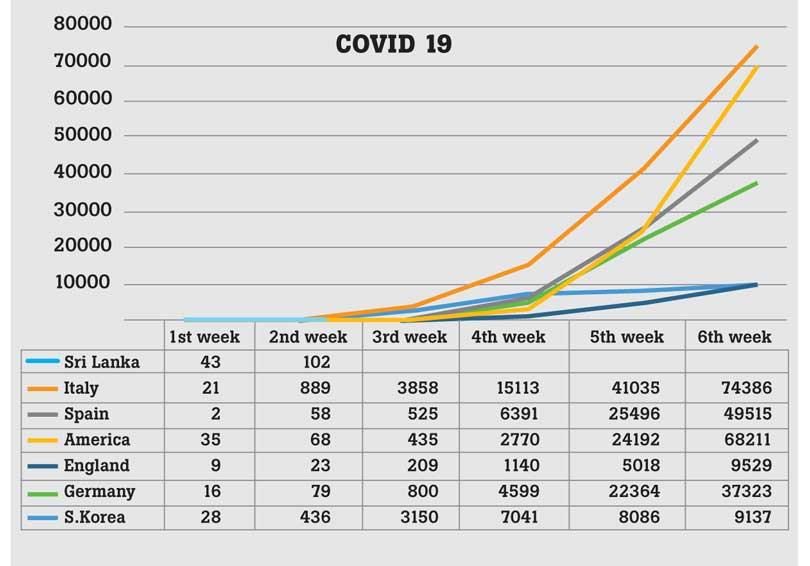
 As we come to the end of the ‘official quarantine’ period and begin to relax the ‘lockdown’ within Sri Lanka but keeping the ‘international lockdown’ in place, we need to look at how the SARS-CoV-2 virus which causes COVID -19 behaved in other countries.
As we come to the end of the ‘official quarantine’ period and begin to relax the ‘lockdown’ within Sri Lanka but keeping the ‘international lockdown’ in place, we need to look at how the SARS-CoV-2 virus which causes COVID -19 behaved in other countries.
Based on actual case numbers from the countries given in the graph, Sri Lanka could expect an upsurge in the number of COVID 19 cases in the coming weeks.
This may get aggravated during the mid-April National New Year (week 6) where we can expect mass internal migration of fellow citizens within the country.
This calls for the health (both state and private sector) and non-health sectors to act in a pre-emptive manner to deal with the inevitable morbidity and morality, which is to be expected.
In terms of the World Health Organisation (WHO) appeal, the health authorities here should use ALL available health resources within the country to deal with the health outcomes and outputs of the pandemic to contain and mitigate it and sustain such control over time.
A key scientific tool in containing and mitigation the spread of the virus is to know with certainty who has the virus and where they are living. the only way of doing this is to test for the virus.
therefore, there is a dire need to rapidly increase and expand the testing of our citizens if we as a country want to have a positive impact on the pandemic in our country and thereby secure the health and wellbeing of our people. The strongest point of our response to the pandemic from a healthcare perspective should be how we improve our weakest point which at the moment is testing for COVID -19.
Please consider this appeal as one of high priority, we have only one chance to get this right – there is no plan ‘b’.
Give below comments from my colleagues on the issue of the need for a rapid expansion of Testing for COVID -19 in Sri Lanka.
Testing is a MUST
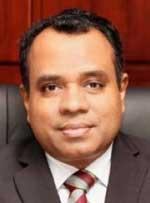 “If we do not expand testing and identify those with the virus the curfews would be useless”
“If we do not expand testing and identify those with the virus the curfews would be useless”
Prof. Vidya Jyothi Vajira H. W. Dissanayake MBBS, PhD, FNASSL
Chair, Senior Professor and Head of Department of Anatomy; Director, Human Genetics Unit; Chairperson, Specialty Board in Biomedical Informatics, University of Colombo, Sri Lanka
“If we do not expand testing and identify those with the virus the curfews would be useless. Besides we need to test the exposed healthcare workers and either clear them as soon as possible so that they can continue to work after the minimum period of isolation or send them for treatment as soon as possible. Otherwise, there will be no one to work – like at De Zoysa Maternity Hospital (DMH) now where all consultant Obestetrics and Gynaecologists (OBGYNs) except for the Prof Unit one is on self-isolation at home.
I looked at the list of lab equipment that the Ministry of Health has requested from donors. I cannot understand the logic behind the genetic equipment that it wants include 9 RT PCR (Real-Time Polymerase Chain Reaction) machines presumably to set up 9 labs in different hospitals. The cost of the equipment that the ministry is looking for is above Rs. 300 million, nothing less. Even if we get the money for these equipment, constructing the labs, bringing down equipment, installing and commissioning them, hiring people, training them to be troubleshooters will take six to nine months. As you know I am talking from experience. And we know how the government system works.
In the meantime, there are labs in universities – Colombo, Sri Jayawardenapura, Kelaniya, Peradeniya, Kotalawela Defence University and the private sector Asiri, Durdens, Nawaloka, Lanka hospitals and SLINTEC that have already functioning labs with RT PCR machines. All we have to do is get the kits and pay for the overheads. I know the universities and the private sector will do it as a national need. We will be up and running by next week. We need testing to be started now. Last Friday’s and yesterday morning’s incidents where people were freely mingling in markets would have speeded up the spread. If we are not detecting cases, the reason is we are not testing”.
Active detection needed
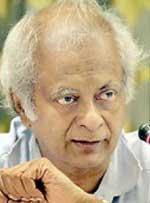 “If we do not actively detect Covid-19 infected, the iceberg would become a volcano”
“If we do not actively detect Covid-19 infected, the iceberg would become a volcano”
Vidyajothi Prof. Harendra de Silva
MBBS(Cey) FRCP (Lond & Edin) FRCPCH (UK) MSc (Birm) FSLCP (SL) DCH (SL) FCGP (Cey) FCCP (SL) FCPS (Pak), Professor Emeritus of Paediatrics (SL)
“We cannot be complacent. We are sitting on the tip of the iceberg. Our testing is limited to PCR at the Medical Research Institute (MRI) and Jayawardenapura hospital. We are not looking out to detect and track cases actively. We are passive: only a selected lot of those seeking treatment are tested. If we do not actively detect, the iceberg would become a volcano. We should now go for rapid slide tests similar to NS1 (Dengue test)”.
“Much more extensive testing as in Singapore and South Korea would allow us to manage the risk of the virus coming in again”
Dr Ravi P. Rannan-Eliya. MA, MBBChir (Cantab), DPH (Harvard)
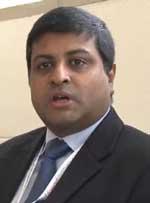 “The current lockdown--national curfews, work at home, school closures- plus Ministry of Health (MoH) actively tracing contacts of foreign arrivals should work in controlling the current outbreak and bringing cases down to zero within two weeks.
“The current lockdown--national curfews, work at home, school closures- plus Ministry of Health (MoH) actively tracing contacts of foreign arrivals should work in controlling the current outbreak and bringing cases down to zero within two weeks.
MoH’s policy will work in stopping the epidemic, but this policy cannot be sustained. The economy is at a standstill, unemployment will rise, businesses will go bankrupt, living standards will fall, and the government has no revenue. We need to allow businesses and schools to re-open and restart normal life and get the economy going.
We also need to open our ports, even on a restricted basis. But allowing foreign arrivals will import the virus again since it has now spread to every country in the world. This is not going to change for the next 12 months. If we open the airport and keep businesses and schools open, then the virus will re-enter and spark a new outbreak, and the government will have no alternative to shutting the airport once again and imposing a curfew. The only solution that allows us to keep our airport open and allows business and schools to stay open is to vastly expand our testing capacity. Much more extensive testing as in Singapore and South Korea would allow us to manage the risk of the virus coming in again and allow MoH to know much earlier when an outbreak is developing, allowing much faster corrective action and avoiding lockdowns. More extensive testing means increasing our testing capacity by at least tenfold so we can test up to 10,000 people a day in an emergency. This capacity will also allow us to adopt Singapore’s policy of testing arrivals to further protect the country. This is probably the safest approach if we want to open the airport.
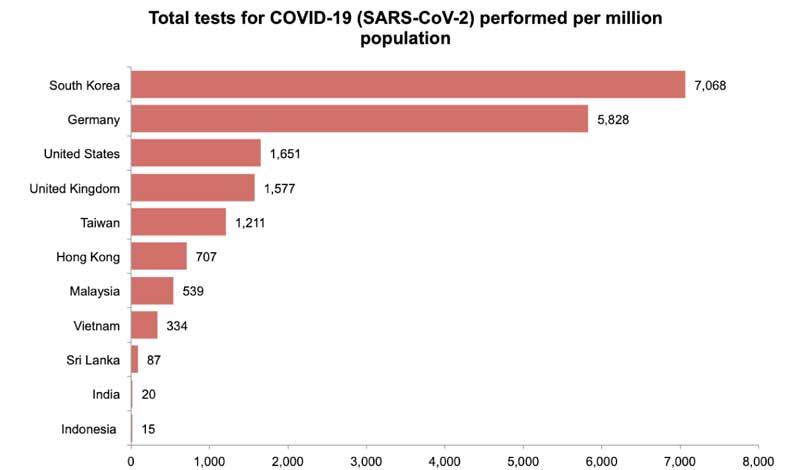
Need for rapid expansion in testing for COVID-19 in Sri Lanka (30/03/2019)
As of March 30, 2020, Sri Lanka has done nearly 2280 tests (Reference http;//covid.iq.lk)
Of these tests 115 persons were positive – 5.5% of tested cases positive. –This is a relatively high rate compared to other countries
Australia which has a population similar to ours has done 160,000 tests and found 3,966 positive cases– positive case rate 2.47%
Hence, given that we are at Stage 3 of the WHO defined stages of COVID and trying hard not to move into Stage 4 (Community Transmission Stage) it is absolutely necessary to move away from the current policy of testing to a policy which rapidly expands testing to detect asymptomatic cases who are not connected to the known cluster to prevent stealth transmission of the covid -19
The writer is MBBS, DFM, PgDip, MSc, MD, FCGP, MRCGP
Head of the Dept. Family Medicine, Faculty of Medicine, University of Colombo andFormer President of Sri Lanka Medical Association (SLMA)
27 Dec 2024 1 hours ago
27 Dec 2024 2 hours ago
27 Dec 2024 3 hours ago
27 Dec 2024 3 hours ago
27 Dec 2024 4 hours ago